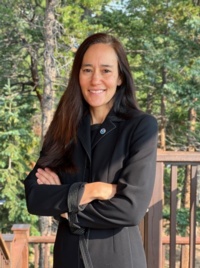Stephanie Herring
Throughout my career, I have been deeply committed to advancing science's role in informing decisions that impact society, and ensuring science has a seat at the decision making table. Early in my career as a Congressional staffer supported by the American Association for the Advancement of Science/American Chemical Society Congressional Fellow program, and through my work at NOAA, I have witnessed firsthand how scientific expertise can shape critical decisions. With over a decade of involvement in AMS, I firmly believe that the AMS enterprise has a pivotal role in informing decisions across sectors.
To increase the societal impact of AMS, I promote AMS building robust partnerships with diverse communities of stakeholders, a commitment reflected throughout my volunteer work across AMS Boards, Committees, and working groups. I believe that collaboration is key to translating the incredible science from across AMS into actionable insights, and in particular partnerships directly with those who operate in the decision-making space. Strengthening ties with government agencies, the private sector, NGOs, and other professional societies is essential. I have actively supported events and collaborations with other professional societies such as the American Planning Association, American Public Health Association, and American Society of Actuaries. Many across AMS are also working with these and other societies and partners, and I see this approach as one that can help bring the scientific expertise of the AMS into the hands of those making decisions.
I have also supported AMS expanding collaboration in areas that advance diverse approaches to science. In partnership with many others, I helped establish the Lazrus Symposium on Indigenous Weather, Water, and Climate Knowledge Systems, weaving together Indigenous knowledge and science with other atmospheric and Earth sciences. Efforts like this tap into AMS's potential to integrate diverse perspectives into decision relevant scientific advancements. A more inclusive AMS at all levels is better positioned to serve society. By embracing diversity, we strengthen our capacity to innovate solutions to complex challenges.
I am eager to contribute to the AMS Council's vision of advancing scientific impact on global decision-making, and support a future where AMS science drives informed decisions and fosters positive societal change.
Stephanie C. Herring is currently serving as Special Advisor to the NOAA Assistant Secretary for Environmental Observations and Predictions where her portfolio focuses on climate services, and NOAA’s transition to cloud services for HPC and AI/ML. She is also head of the Geophysical Science and Development Branch at NOAA’s National Centers for Environmental Information in Boulder, Colorado. The Branch’s work covers solar and terrestrial physics and marine geology and geophysics. Her personal research focus areas are extreme events and climate services. She is also the chair of the AMS Board on Enterprise Decision Support, and former chair of the AMS Climate Services Committee. Prior to her current position at the NCEI, she served as the Senior Climate Advisor for NOAA’s Deputy Under Secretary for Operations in Washington D.C.. Before coming to NOAA, she worked as a Congressional staffer and science policy advisor focusing on climate legislation. She completed her post doctoral research at the National Institutes of Health, holds a PhD from Yale University, and an undergraduate degree from Swarthmore College. In her free time she enjoys mountain biking, skiing, and rafting trips with her family.
